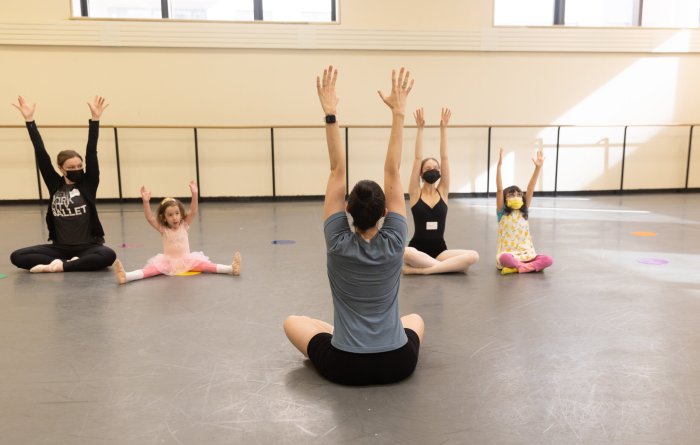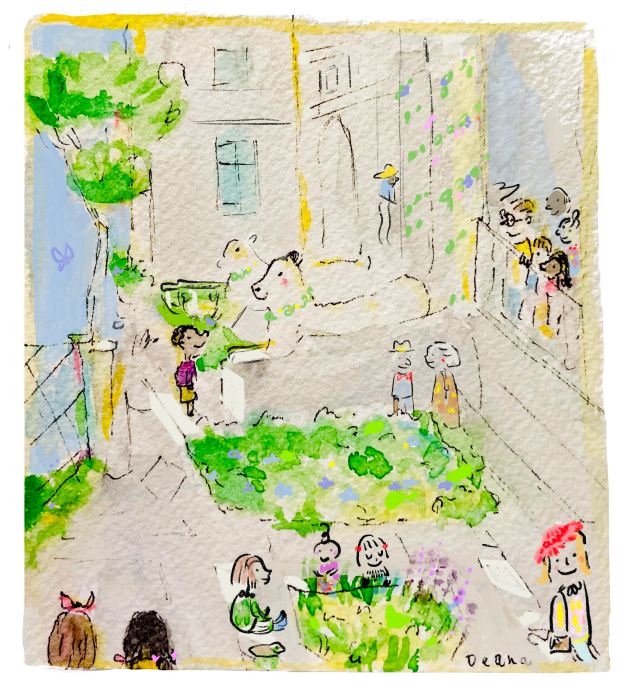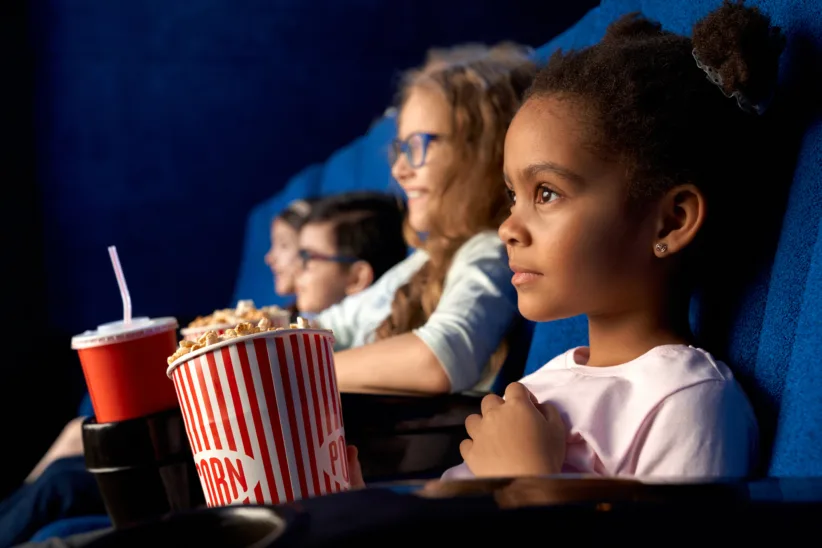It’s a Sunday afternoon at the DiCapo Opera Theatre on East 76th Street, and the sold-out crowd grows quiet as the curtains part for a new scene. The lights go up, the opening chords sound, and instantly the small stage brims with life — filled end-to-end with brightly dressed actors winding their way through the 19th century Parisian market scene of Puccini’s “La Boheme”.
Throughout the crowd are a dozen children. Some are dressed in Sunday finery and holding parents’ hands, while others are street urchins racing about on missions of mischief only to be caught and scolded by a guardian.
Soon the clown comes, bringing toys, and like a litter of hungry pups, the kids gather around him center stage.
“Ecco Parpignol! Parpignol!!,” they sing in their loudest and best Italian. “Voglio la tromba, il cavallin.” (In English: It’s Parpignol the Clown! I want the trumpet, the little toy horse!)
As the principals come forward to sing, the small children fold gracefully into the wings awaiting their next entrance, while the larger ones strike mannequins’ poses in the dim corners of the stage to wait out
“Musetta’s Waltz”.
Soon, the activity begins again, and the children take places onstage to sing with the full chorus, hopping about and waving excitedly as a military parade passes, and singing once more (“la ritirata”/”the parade”). As the celebration winds down, they disburse, following the action offstage. For them, it’s over; they have delivered their last song line. In all, they were
stageborne about 20 minutes.
This is an example of what it means to be an “opera kid” — part of a children’s chorus with one of New York City’s opera houses. There are at least four opera houses in the city, and their children’s choruses range in size from 15 at the Amato Opera House, to 90 at the Metropolitan Opera at
Lincoln Center. While few operas offer children any solo roles — Mozart’s
“Magic Flute” being the most notable exception — almost all members do choral work and act as supernumeraries (non-singing decorative characters) in main stage operas.
“It’s the best after-school extracurricular activity there is, in my opinion, ” says Sasha Herman, 13, a male child soloist at the Met and chorus member for six years. “Sure, you like playing basketball with your friends, but once you get onstage, it’s something special. It’s hard to describe.”
Learning to sing opera is an exercise in discipline and hard work — sometimes 20-plus hours per week. In a world where so many MTV kids devour pop culture by wearing L.E.I., playing CDs and watching DVDs, an opera-singing kid, especially a boy, might be construed by peers as ‘uncool’ or even a “sissy”. But children in these choruses say opera has its perks, including great musical training, money, star-gazing, and some big-time dress-up.
“I have to say that my last (19th century) costume was kind of not ‘today’,” says Tania Marinos, 10, who sings with DiCapo and played a waitress in the “Boheme” production. “It was hot, especially with the bloomers. But whenever I looked at myself in the mirror, I thought, ‘This is perfect, I’m back in time’. Plus, it was great wearing all that stage makeup.”
Elena Doria, children’s chorus director for the Met, trains boys and girls aged 7 to 14 during opera season (usually August through May) a few afternoons a week and on Saturdays. This season, children will appear in 14 productions, six requiring singing and eight using children as supernumeraries.
“The children come to love it,” says Doria, a former Met adult chorus member, and children’s director for 17 years. “And I don’t just stop at teaching notes. They learn everything I’ve got to offer and come to appreciate the greatest form of performing arts — grand opera. That is the biggest benefit.”
Back at the DiCapo Opera, children will take the stage in three of the company’s four productions this season. At the New York City Opera (NYCO), whose experimental season has 17 productions, children will appear in only six of them, according to children’s chorus director Anthony Piccolo, but will learn difficult music. Since nearly 70 percent of children’s operatic roles require boys, every chorus director perks up when a boy comes in for an audition. Piccolo’s company of 40 children (slightly more boys than girls) is able to fill all the boys’ roles, but some companies will substitute a girl in a boy’s costume if they can. Unlike Broadway productions, which rely on agents, opera companies recruit their kids through word-of-mouth. Amato Opera co-director Irene Kim says that the Amato Opera occasionally gets child recruits directly from the audience and adds, “If we put an ad in, we’d have hundreds.”
All children have to pass vocal tests. Piccolo asks them to sing “Happy
Birthday”.
“Believe it or not, ‘Happy Birthday’ gives you range and, when I accompany them, it gives me a definite indication of the ear,” he says. “It also shows whether they can enunciate clearly.”
All chorus directors look for vitality and that unflappable ‘stage presence’. Piccolo describes it as the ability to “vibrate”, to be larger than life on stage.
“You could say this profession is not for wallflowers,” adds Doria, who brings a bright-eyed, animated style to her teaching in part due to her years as a performer. “They are inevitably the ones who end up as the supernumeraries — and then I have ‘mommy’ problems.”
For most children, getting on a stage for that first time — whether in front of an audience of 100 or 4,000 — is a confidence-building experience.
“At first, I felt scared,” says Ryan Taverna, 8, a newcomer last season who performed in DiCapo’s “La Boheme” and says he used to perform little shows at home to prepare. “Everybody was just staring at me and I was frozen. But then it passed when I sang. After the first time, it was fun every time.”
And then there is the delight of star-gazing. In the opera world, the true stars are few. But in his six-year stint with the Met chorus, Sasha Herman has sung onstage with Placido Domingo, Luciano Pavarotti and Renee Fleming — three of the greats.
“Once you are on stage, you are all equals,” he says. “Even though they are so much better, you are all opera singers and it kind of puts you at this special level.”
But Sasha’s sights are not set on a solo career, at least not yet. “The chances of being the next Pavarotti are slim,” he acknowledges with a smile.
Some of the opera kids do go on to musical careers. Doria cites two former students, Monica Yunus, a graduate student at Juilliard, and Tammy
Tyburczy, as promising soloists. And Diane Martindale, children’s chorus director and co-founder of the DiCapo Opera, is the recipient of perhaps the ultimate tribute: her former student Michael Capasso founded the DiCapo
Company with her and now directs it.
“I feel that teaching opera has been my calling,” says Martindale. “Opera has made my life worthwhile, and I am glad I have been able to share it with children.”





















